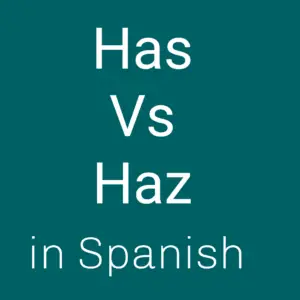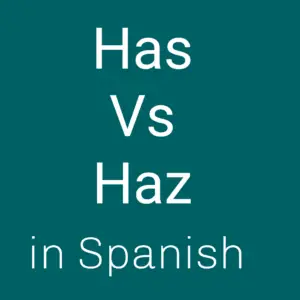When learning Spanish, it’s important to understand the difference between “has” and “haz,” as they can be easily confused due to their similar spellings.
The main differences between “has” and “haz” in Spanish are:
- “Has” is the present tense form of the verb “haber,” meaning “to have.” It is used to express possession or to form compound verb tenses.
- “Haz” is the imperative form of the verb “hacer,” meaning “to do” or “to make.” It is used to give commands or instructions.
- “Has” is typically used in sentences like “Tú has aprendido español” (You have learned Spanish), where it indicates possession or completion of an action.
- “Haz” is commonly used in sentences like “Haz tu tarea” (Do your homework), where it is an imperative command telling someone to perform a specific action.
Remember that “has” corresponds to the verb “haber” and expresses possession, while “haz” corresponds to the verb “hacer” and is used to give commands. Understanding these distinctions will help you use the correct form in different contexts.

What is the difference between has vs haz in Spanish?
Has is the auxiliary form of the verb to have used for the formation of compound tenses. Haz, meanwhile, is the verb to do in the second person imperative.
The difference between has and haz is perceived above all in writing in the case of sixties countries, where there is no opposition between the sound of the s and the z. On the other hand, in Spain, where this distinction does exist, it is easy to appreciate when you say haz and when has due to the pronunciation, which allows you to identify how it is written.
When to use haz in Spanish?
Haz can be a personal form of the verb to do or a noun of masculine or feminine gender.
Haz: Imperative form of verb “hacer” (to do)
As a verb, haz is the imperative second-person singular form of doing; It is used to ask or require someone to perform or execute a task or take care of an issue. It implies a command, an order.
For example:
Haz las cosas rápido. – Do things fast.
Por favor, haz la cena. – Please make dinner.
Haz lo que te dicen. – Do what they tell you.
Haz tu tarea – Do your homework
Sentences using haz in Spanish
| El leñador llevó el haz de troncos hasta el pueblo. | – | The woodcutter carried the bundle of logs to the village. |
| Me desperté con un haz de luz que entró por la ventana. | – | I woke up to a beam of light coming through the window. |
| Haz el trabajo como mejor te parezca. | – | Do the job as you see fit. |
| El campesino ató el haz de lino para subirlo al camión. | – | The peasant tied the bundle of flax to load it onto the truck. |
| Haz el informe con los datos que te envió el cliente. | – | Make the report with the data that the client sent you. |
| ¿Ese haz de luz lo produjo un helicóptero? | – | Was that beam of light produced by a helicopter? |
| Haz el curso que más te guste. | – | Take the course that you like the most. |
| Si vas a París, haz el paseo de pintores. | – | If you go to Paris, do the painters walk. |
| Tienes el haz muy pálido. | – | You have a very pale beam. |
| Haz tu cama cuando acabes de desayunar. | – | Make your bed when you finish breakfast. |
| ¡Haz tu tarea! | – | Do your homework! |
| Emily, haz lo que tengas que hacer. | – | Emily, do what you have to do. |
| Haz tiempo para ganar el partido. | – | Make time to win the match. |
| El joven tomó el arco y un haz de flechas. | – | The young man took the bow and a bundle of arrows. |
| Como hacía frío tomé un haz de leña y lo eché a la chimenea. | – | Since it was cold, I took a bundle of wood and threw it into the fireplace. |
| El haz de luz me cegó por un momento. | – | The beam of light blinded me for a moment. |
| Estaba esperándote cuando un haz de luz cruzó el cielo. | – | I was waiting for you when a beam of light crossed the sky. |
| La hermosa campesina tomó un haz de flores y me las regaló. | – | The beautiful country girl took a bunch of flowers and gave them to me. |
| La niña alimentaba al poni con un haz de alfalfa. | – | The girl fed the pony a bundle of alfalfa. |
| ¿Cuál es la diferencia entre haz y has? | – | What is the difference between haz and has? |
| ¿En qué casos se usa haz? | – | In what cases is beam used? |
| Haz el bien y no mires a quién. | – | Do good and don’t look at who. |
| Haz lo que te pedí hace rato. | – | Do what I asked you a while ago. |
| Ve y haz cien repeticiones para que aprendas. | – | Go ahead and do a hundred reps for you to learn. |
| Haz el bien siempre que puedas. | – | Do good whenever you can. |
| Haz como si no lo vieras. | – | Pretend you don’t see it. |
| Si quieres ver la peícula, haz la tarea. | – | If you want to see the movie, do your homework. |
| Haz de cuenta que no me conoces. | – | Pretend you don’t know me. |
| Haz lo que quieras, ya no me importa. | – | Do what you want, I don’t care anymore. |
| El haz de luz atravesó la oscura noche. | – | The beam of light pierced the dark night. |
As a noun, haz has several definitions. Haz, as a masculine noun, can refer to the propagation of light rays from the same source or to a bundle or bundle of things.
For example:
Yo traje un haz de caña. – I brought a cane bundle.
When to use has in Spanish?
Has is the verb to have conjugated in the second person singular of present indicative. It is used in the formation of compound tenses, so that it is always followed by a participle (has + participle), giving rise to the verb form of the second person singular of the past perfect compound, also known as antepresente.
Has: Is from the auxiliar verb “haber” (have been)
For example:
Sentences using has in Spanish
| No has venido a verme en un tiempo. | – | You haven’t come to see me in a while. |
| Nunca lo has intentado mejorar. | – | You have never tried to improve it. |
| ¿Has venido a ver al niño? | – | Have you come to see the boy? |
| No sé cómo me has encontrado. | – | I don’t know how you found me. |
| Nunca me has podido engañar. | – | You have never been able to fool me. |
| Siempre has estado en el mismo lugar. | – | You have always been in the same place. |
| ¿Has visto cómo te mira Frank? | – | Have you seen the way Frank looks at you? |
| No has venido por propia voluntad. | – | You have not come of your own free will. |
| No me has demostrado jamás tu interés en el asunto. | – | You have never shown me your interest in the matter. |
| Jamás has sido tan feliz como lo fuiste conmigo. | – | You have never been as happy as you were with me. |
| ¿Has hablado con Gisela? | – | Have you talked to Gisela? |
| Te has adelantado a los acontecimientos. | – | You have anticipated the events. |
| Siempre me has demostrado tu amistad. | – | You have always shown me your friendship. |
| Tú has estado muy preocupado últimamente. | – | You have been very worried lately. |
| No has hecho lo que te pedí. | – | You haven’t done what I asked. |
| Tú has venido varias veces ya. | – | You have come several times already. |
| Has sido un gran amigo conmigo. | – | You have been a great friend to me. |
| Has de comer mejor. | – | You have to eat better. |
| Esta noche has de llamarme. | – | You have to call me tonight. |
| Tú no has de hacer lo que no te gusta. | – | You don’t have to do what you don’t like. |
| Has de llegar a tiempo. | – | You have to arrive on time. |
| Has cambiado mucho, Nurya. | – | You have changed a lot, Nurya. |
| Te has de avergonzar de lo que haces. | – | You should be ashamed of what you do. |
| Has sido un padre pésimo. | – | You have been a lousy father. |
| Me has privado de muchas cosas. | – | You have deprived me of many things. |
| Has prometido olvidarla. | – | You have promised to forget her. |
| ¿No me has conocido? | – | Haven’t you met me? |
| Has sido una gran persona. | – | You have been a great person. |
| Juan, has esperado mucho por tu ascenso. | – | Juan, you’ve waited a long time for your promotion. |
| Has hecho mucho por llegar a donde estás ahora. | – | You have done a lot to get to where you are now. |
Has de comer antes de que salgamos. – You have to eat before we go out.
No has de hablar nada.- You don’t have to speak anything.
Has estado ocupado?- Have you been busy?
Note: Haz and has are forms of two different verbs “hacer” and “haber”

Leave a Reply
You must be logged in to post a comment.